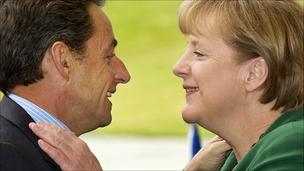 German Chancellor Angela Merkel and French President Nicolas Sarkozy have hammered out a common position on the euro debt crisis.
German Chancellor Angela Merkel and French President Nicolas Sarkozy have hammered out a common position on the euro debt crisis.
A statement by the French president's office said agreement had been reached after seven hours of talks in Berlin.
It comes ahead of a crunch meeting of eurozone leaders to resolve the Greek debt crisis and prevent further contagion to other eurozone economies.
Details of the deal have not yet been released.
But there are indications that a new tax on Europe's banks to help fund any new aid packages may not be part of the deal.
Arriving at the summit, the head of the Eurogroup of finance ministers, Jean-Claude Juncker, played down the bank tax idea.
"I do not think there will be an agreement on that subject," he said.
Germany had previously insisted that private lenders to Greece should be forced to take losses as part of any further rescue deal for Athens.
But this had been opposed by France and the European Central Bank, which fear it could spark a Europe-wide banking crisis, push Spain and possibly Italy into trouble, and even jeopardise the solvency of the ECB itself.
Meanwhile, new figures from Markit's PMI survey show that the eurozone's private sector grew at its weakest pace in almost two years in July, recording a score of 50.8, down from 53.3 in June. Any score above 50 indicates growth.
"The eurozone recovery lost almost all of its momentum in July," said Markit's chief economist Chris Williamson.
Also on Thursday, Spain was forced to pay a higher rate of interest to borrow money from international investors. Madrid had to offer a yield of 5.9% on 10-year bonds, up from 5.4% at a similar auction last month, in order to raise 1.8bn euros ($2.6bn; £1.6bn).
'Very serious'
Policymakers are set to discuss a range of measures at the meeting later on Thursday, including a new loan package to Greece and the role of private investors in any debt restructuring.
But German Chancellor Angela Merkel has cautioned against over optimism.
Greece received its first aid package in May last year, but the debt crisis continues to undermine confidence in global financial markets, with some commentators suggesting it threatens the future of the euro itself.
Politicians and investors are calling for decisive action to help bring the crisis to an end.
"Nobody should be under any illusion; the situation is very serious," European Commission President Jose Manuel Barroso said on Wednesday.
"It requires a response. Otherwise, the negative consequences will be felt in all corners of Europe and beyond."
The Governor of the Bank of England, Sir Mervyn King, has said that the crisis in the eurozone posed the most serious and immediate risk to the UK's financial system.
President Barack Obama has also weighed in, calling Mrs Merkel on Tuesday night to stress the importance of tackling the debt crisis in sustaining the global economic recovery.
The International Monetary Fund has also called on European leaders to take swift and decisive action.
Delaying such action further would be "very costly" for the world economy, it said.



